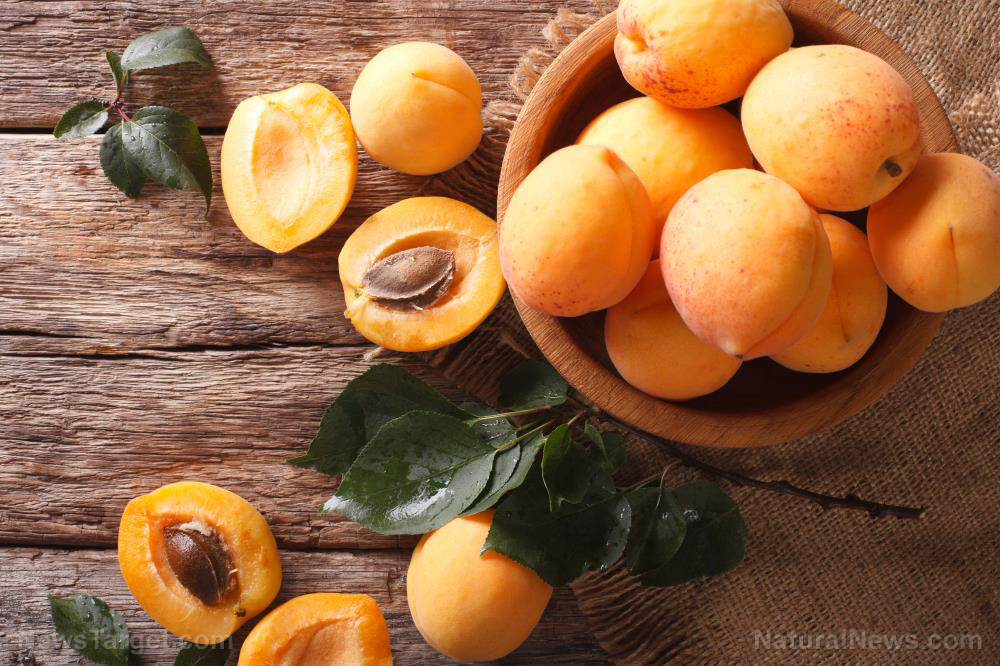Apricots, cherries, plums and more: 6 Nutrient-rich stone fruits you need to add to your diet

(Natural News) Stone fruits, also known as drupes, are fruits that contain a hard pit or “stone” deep in the center of their soft and delectable outer flesh. Mouth-watering and juicy, these fruits are packed with a plethora of beneficial phytonutrients and antioxidants. They also offer a wide variety of health benefits. If you want to boost your nutrient intake, why not add some of these delicious stone fruits to your daily diet?
Apricots
Apricots are small fruits characterized by a golden orange color. Like many other brightly-colored fruits, apricots are a rich source of antioxidant pigments. In particular, apricots are loaded with beta-carotene, a potent carotenoid that your body converts into vitamin A. Other vitamins that can be found in apricots include vitamins C, E and K, as well as various B vitamins. You can also get plenty of catechins from eating apricots. These powerful phytonutrients can help reduce inflammation in your body and regulate your blood pressure.
Cherries
Despite their small size, cherries are bursting with both flavor and nutrition. These tiny stone fruits get their rich red hue from their natural abundance of anthocyanins, procyanidins, flavonols and other antioxidants, which protect your body from oxidative stress. Cherries also contain high amounts of fiber, copper, magnesium, manganese and vitamins A, B6, C, E and K. For athletes, cherries can make a great post-workout snack to support healthy muscle recovery. (Related: Cherries are nutrient-dense, low-calorie fruits that provide important nutrients necessary for your best health.)
Enjoy up to 51% OFF your favorite workout supplements, functional snacks, beverages and more at the Health Ranger Store's Black Friday and Cyber Monday Superfoods and Supplements Flash Sale event. This limited-time sale is going on NOW and runs through Saturday at midnight... only while supplies last. Learn more here.
Plums
Plums can be eaten fresh or dried, and they come in a wide variety of colors, ranging anywhere from deep purple to bright yellow. No matter what color you pick, plums are bound to be rich in phytonutrients. Some of the antioxidants that can be found in plums include vitamin C and phenolic compounds, such as proanthocyanidins and kaempferol. Plums are known to promote healthy digestive and cardiovascular systems. Munch on some fresh plums for a tasty nutrient-rich snack or eat them with your favorite oatmeal, cereal, salad or yogurt.
Peaches
Closely related to apricots, peaches are also rich in carotenoids that can support healthy eye function. These carotenoids include beta-carotene, lycopene, lutein, cryptoxanthin and zeaxanthin. Peaches can also promote deep and restful sleep due to the natural sedative compounds they contain, so you can eat them as a late-night snack or dessert. In fact, peaches are known as the “fruit of calmness” in Hungary. Some nutrients you can find in peaches include copper, manganese, niacin, fiber, potassium and vitamins E and K. Best of all, peaches are low in calories and contain no fat.
Lychees
Also known as litchi, lychees are particularly high in vitamin C. In fact, you can get approximately 226 percent of your Reference Daily Intake (RDI) of vitamin C from eating a single cup of fresh lychees. Because of this, lychees are excellent for supporting healthy skin, bones and immune system. Other nutrients found in lychees include phosphorus, potassium, copper, fiber, protein and vitamins B2 and B6. Lychees also contain phenolic compounds, such as rutin, epicatechin, chlorogenic acid, caffeic acid and gallic acid.
Mangoes
Mangoes are tropical superfruits that are native to southern Asia. These delectable stone fruits are filled with antioxidants such as carotenoids, anthocyanins and vitamins A, C and E. Additionally, mangoes contain a unique antioxidant called mangiferin, which promotes healthy heart function. With their impressive nutritional profile, mangoes are sometimes called the “king of fruits.” These high- fiber fruits also contain plenty of B vitamins, magnesium, potassium, and copper.
Top your favorite fruit salads, smoothies or cereal with any of these delicious stone fruits for a sweet dose of nutritional goodness.
Sources include:



